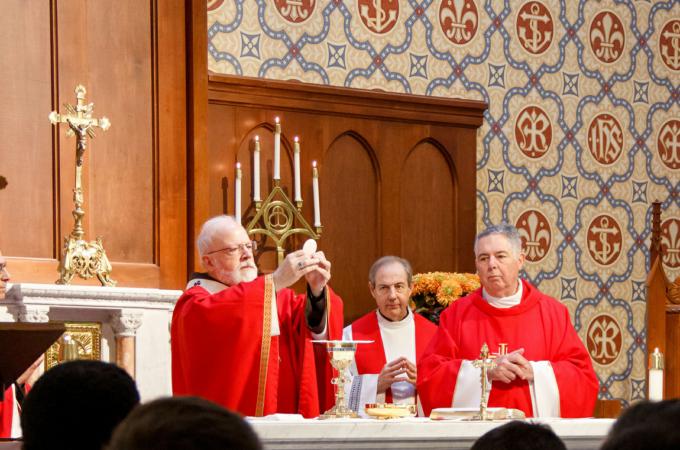Annual Red Mass honors service of legal professionals
BOSTON -- Over 160 people, including 25 law students and dozens of legal professionals and their families, gathered at Our Lady of Good Voyage Seaport Shrine on Nov. 17 for the annual Red Mass, organized by the Catholic Lawyers Guild of the Archdiocese of Boston.
This annual event traces its roots back to the Middle Ages, when lawyers would gather at the beginning of the court term to ask the Holy Spirit for guidance in their profession. Its name is derived from the fact that judges wore red robes and the clergy wore red vestments for the Mass of the Holy Spirit.
Cardinal Seán O'Malley was the principal celebrant at the Mass. In his homily, he spoke about the challenges of living out faith in a secular society and being a missionary in one's community and profession.
"Today, in a special way, we want to remember in prayer all of those involved in our legal system. Yours is a vocation that affects the quality of life of the whole community. So many issues -- economic justice, racial equality, human and civil rights -- are the things that you struggle with every day," the cardinal said.
He talked about the importance of advocating for the vulnerable in society, particularly the unborn, the elderly, immigrants, and refugees. He noted that neither of the major political parties holds a "consistent life ethic," so Catholics must look to gospel values to shape their philosophy of life.
"We must love all people, even those who advocate abortion or those who persecute immigrants. It's only when we love them that we will be able to help them discover the sacredness of life of an unborn child. Only love and mercy will open hearts that have been hardened by individualism. Only a coherence in our behavior will make our social doctrine of a consistent life ethic believable to people," Cardinal O'Malley said.
The Red Mass was followed by brunch and a speaking program at the Seaport Hotel, during which the Catholic Lawyers Guild presented the Honorable Joseph R. Nolan Award.
Named after the first president of the Guild, this award is given annually to a member of the legal profession who, like Justice Nolan, exemplifies compassion, excellence in the law, and dedication to family and to the Catholic faith.
The keynote speaker and the recipient of this year's Nolan Award was Attorney Dwight G. Duncan. A graduate of Harvard College and Georgetown University Law Center, Duncan received his Licentiate and Doctorate in Canon Law at the Pontifical University of the Holy Cross in Rome. He has been a professor at the University of Massachusetts Law School since 1989. He is also a member of Opus Dei and the Knights of Columbus.
In his remarks, Duncan said the work of a lawyer can be understood in four ways, looking at it as a job, a career, a profession, or a vocation.
He pointed out that the law was one of three professions that studied in medieval universities. Law was studied in Bologna, medicine in Salerno, and theology in Paris. What the professions of lawyers, doctors, and clergy have in common, Duncan said, is that they are "supposed to be about something truly above."
"What characterizes a profession is an advanced level of expertise or learning; service to others, clients, patients or souls; and pursuit of a social good, justice, health, or salvation," Duncan said.
Professionals also profess something, he said. Lawyers take the attorney's oath, doctors take the Hippocratic Oath, and clergy profess the Creed.
Another commonality between the professions, Duncan said, is "a strong ethos of service."
"The profession has broken out of the orbit of self. It's not simply about me anymore, it's about others," Duncan said.
He talked about the etymology of two other words for legal professionals, "advocate" and "counselor," which come, respectively, from the Latin and ancient Greek words meaning "called to."
"Both 'advocate' and 'counselor' are relational terms. It's not just about me, it's about being summoned to justice for the client," Duncan said.
He encouraged the legal professionals and law students to have humility, a sense of humor, a passion for justice, and love for clients, adversaries, and court personnel.
"Jesus said 'I came to serve and not to be served.' We should approach every legal challenge with the goal of being of help. This takes humility. To help is to serve. To serve is to be a servant," Duncan said.



















